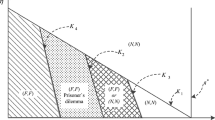Abstract
We study a game model of multi-leader and one-follower in supply chain optimization where n suppliers compete to provide a single product for a manufacturer. We regard the selling price of each supplier as a pre-determined parameter and consider the case that suppliers compete on the basis of delivery frequency to the manufacturer. Each supplier's profit depends not only on its own delivery frequency, but also on other suppliers' frequencies through their impact on manufacturer's purchase allocation to the suppliers. We first solve the follower's (manufacturer's) purchase allocation problem by deducing an explicit formula of its solution. We then formulate the n leaders' (suppliers') game as a generalized Nash game with shared constraints, which is theoretically difficult, but in our case could be solved numerically by converting to a regular variational inequality problem. For the special case that the selling prices of all suppliers are identical, we provide a sufficient and necessary condition for the existence and uniqueness of the Nash equilibrium. An explicit formula of the Nash equilibrium is obtained and its local uniqueness property is proved.
Similar content being viewed by others
References
Arrow K.J., Debreu G.: Existence of an equilibrium for a competitive economy. Econometrica 22, 265–290 (1954)
Benjaafar S., Elahi E., Donohue K.L.: Outsourcing via service competition. Manag. Sci. 53, 241–259 (2007)
Bernstein F., Federgruen A.: Coordination mechanisms for supply chains under price and service competition. Manuf. Serv. Oper. Manag. 9, 242–262 (2007)
Cachon G., Harker P.: Competition and outsourcing with scale economies. Manag. Sci. 48, 1314–1333 (2002)
Cachon G., Zhang F.: Obtaining fast service in a queueing system via performance-based allocation of demand. Manag. Sci. 53, 408–420 (2007)
Chinchuluun A., Migdalas A., Pardalos P.M., Pitsoulis L.: Pareto Optimality, Game Theory and Equilibria. Springer, New York (2008)
Debreu G.: A social equilibrium existence theorem. Proc. Natl. Acad. Sci. USA 38, 886–893 (1952)
Miguel V., Xu H.: A stochastic multiple-leader Stackelberg model: analysis, computation, and application. Oper. Res. 57, 1220–1235 (2009)
Facchinei F., Kanzow C.: Generalized Nash equilibrium problems. 4OR 5, 173–210 (2007)
Facchinei F., Pang J.-S.: Finite-Dimensional Variational Inequalities and Complementarity Problems. Springer, New York (2003)
Federgruen A., Heching A.: Combined pricing and inventory control under uncertainty. Oper. Res. 47, 454–475 (1999)
Ha A., Li L., Ng S.-M.: Price and delivery logistics competition in a supply chain. Manag. Sci. 49, 1139–1153 (2003)
Hall J., Porteus E.: Customer service competition in capacitated systems. Manuf. Serv. Oper. Manag. 2, 144–165 (2000)
Harker P.T.: Generalized Nash games and quasi-variational inequalities. Eur. J. Oper. Res. 54, 81–94 (1991)
Kalai E., Kamien M., Rubinovitch M.: Optimal service speeds in a competitive environment. Manag. Sci. 38, 1154–1163 (1992)
Li L.: The role of inventory in delivery-time competition. Manag. Sci. 38, 182–197 (1992)
Li L., Lee Y.S.: Pricing and delivery-time performance in a competitive environment. Manag. Sci. 40, 633–646 (1994)
Lin G.H., Fukushima M.: Stochastic equilibrium problems and stochastic mathematical programs with equilibrium constraints: a survey. Pac. J. Optim. 6, 455–482 (2010)
Loch C.: Time competition is capability competition, Working Paper, INSEAD (1994)
Pang J.-S., Fukushima M.: Quasi-variational inequalities, generalized Nash equilibria, and multi-leader-follower games. Comput. Manag. Sci. 2, 21–56 (2005)
Rosen J.B.: Existence and uniqueness of equilibrium points for concave N-person games. Econometrica 38, 520–534 (1965)
So K., Song J.S.: Price, delivery time guarantees and capacity selection. Eur. J. Oper. Res. 111, 28–49 (1998)
Author information
Authors and Affiliations
Corresponding author
Additional information
This paper was presented at the Eighth International Conference on Optimization: Techniques and Applications (ICOTA8) in Shanghai, December 2010.
Rights and permissions
About this article
Cite this article
Ang, J., Fukushima, M., Meng, F. et al. Establishing Nash equilibrium of the manufacturer–supplier game in supply chain management. J Glob Optim 56, 1297–1312 (2013). https://doi.org/10.1007/s10898-012-9894-3
Received:
Accepted:
Published:
Issue Date:
DOI: https://doi.org/10.1007/s10898-012-9894-3



